In the Worrying From Home series, we’re trying to open a discussion with other B2B marketers about if, how, when and whether to market during the coronoavirus pandemic.
On the way, we’ll try to look for principles to guide marketers during these weird and worrying times. Here are four:
1. Don’t hide your agendas.
The most common response to the COVID-19 crisis has been the “expression of concern for our customers at this difficult time”.
That’s fine and right. You’re genuinely concerned and you want to express it.
But it’s all too easy to let other agendas seep into even the most heartfelt messages. That can give people the impression that your real concern is for your business first—and that your concern for customers (or God forbid, for non-customers) is a distant second.
Is concern for your business such a bad thing?
Of course not. It’s entirely natural and everyone will understand it.
What tastes bad is hiding that very natural concern behind a stance of total altruism.
I’m advising our clients to be careful about mixing product messages in with genuine expressions of concern.
If your products or services really can help people at a time like this, that’s great. But be careful about telling people about that in the same breath (or email) as your expressions of concern.
And be careful about looking too happy about your new product/market fit. It’s unseemly to act like the lucky winner of the COVID lottery.
A note from PayPal’s CEO
An expression of concern came into my inbox yesterday. Subject line: “A Message from PayPal’s President and CEO, Dan Schulman”.
Here’s how it started:
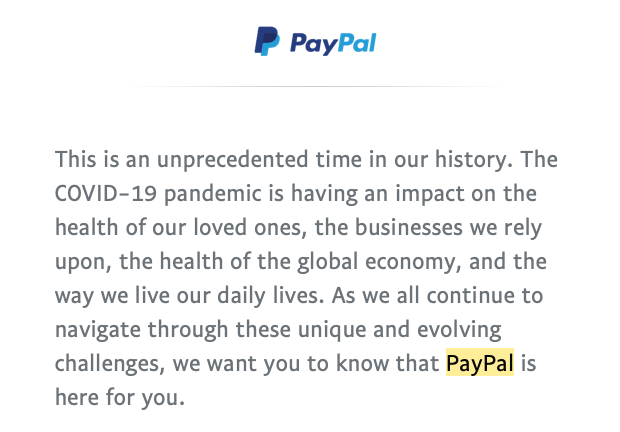
This is not unusual. Personally, I’d tone down the ‘president’s address to the nation’ tone but that’s probably a taste thing.
But the, “…we want you to know that PayPal is here for you” risks a bad reaction (and, to be honest, elicited one in me).
This kind of phrase is triggering a lot of backlash on social media.
I screen-shotted (screen-shat?) this tweet from one of my favorite marketing gadflies, Ryan Wallman, (before I got the PayPal email):
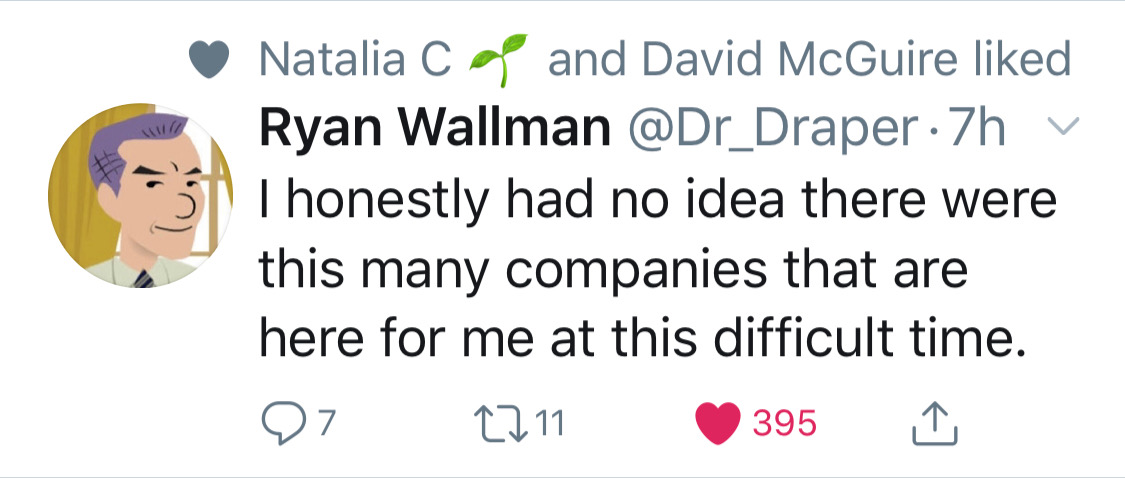
That’s the problem with this approach: it can feel like the brand is assuming a larger role in my life than I have given it permission to assume.
For me, the PayPal message took it too far. The next paragraph:
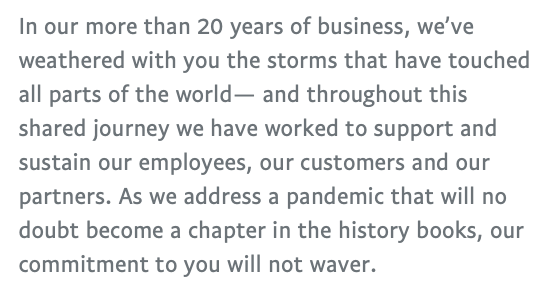
I don’t know about you but I feel we’re now into the Churchill Zone. (Am I being churlish? Comments invited.)
Since we’re on a hunt for principles in this series, here’s one:
2. Be careful about assuming you’re more important to your audience than you really are.
Clearly, this varies by individual recipient. A small business that uses PayPal to process 100% of it’s payments may well need to hear about how PayPal has its back right now.
But to a guy who occasionally uses it to buy guitar strings? Not so much.
Tom Fishburne, the famous Marketoonist nailed it here:
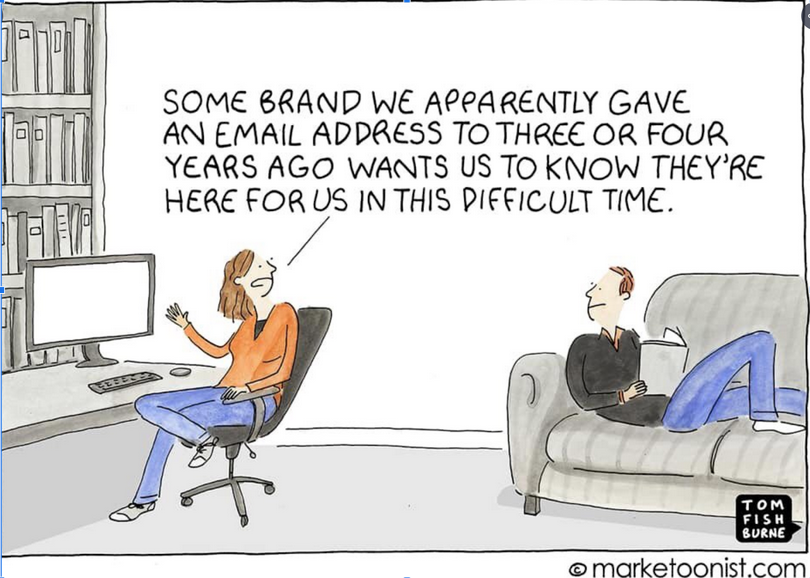
So I’m already going into the next part of the email with a yukky feeling.
That would be absolutely fine if the next part was all about what PayPal is doing to help its merchants.
Is it cutting subscription fees for all small businesses? Is it waiving the bills of small restaurant owners forced to close?
This is maybe the most important principle of all when marketing in a crisis:
3. It’s not what you say, it’s what you do.
If your products really do help companies in this tough time, then cut your prices or give them free to those who need them (obviously only if your own business is sound enough to be able to do that).
If, through luck, you happen to be making more money during this crisis—and a lot of companies will be—then share some of that with the customers who need you most right now. Or share it with non-customers who need you.
Urgent Appeal Break: Translators Without Borders is working their butts off to translate critical COVID-19 information into as many languages as they can to fight this global pandemic. (Yes, even non-English speakers want their families to survive). You can help them by donating here. [Disclosure: I’m on the board. But this is incredibly important right now and no one else is doing it.]
What you don’t want to do is to give your product messages a halo that signals, “These are all the ways we’re here to help you right now.”
Unfortunately, that’s what the PayPal email appears to do. Because it goes on to list a bunch of services, with links to the normal product pages, using the introduction, “We stand ready to help you with safe, secure and affordable digital payment services as you navigate these uncertain financial times:”
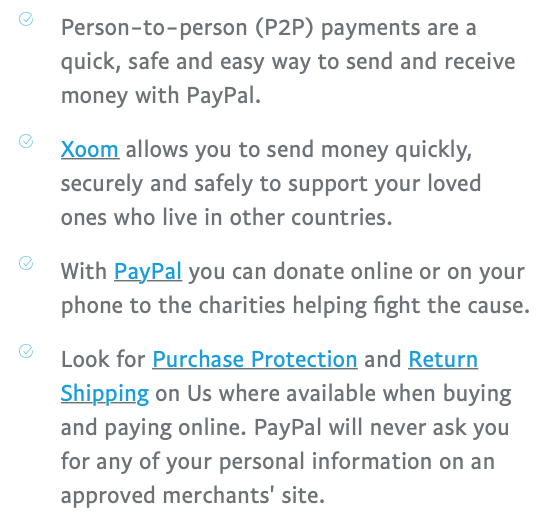
By now, I’m not feeling good about this PayPal message (it’s a company I really do admire, BTW).
Of course they have a right to tell people about the products that might help businesses right now.
And of course they don’t want their own business to suffer or to have to lay people off.
And they may be doing many, many things to help customers and just not shouting about it.
So, let’s not vilify PayPal. They’re one of thousands of companies who may have unintentionally drifted over the taste line. We’re all trying to figure this out.
A tip for making your helping feel less like selling:
If your products really are relevant right now, but you don’t want to sell-sell-sell, here are two things you might try:
Share ideas that don’t relate to your products. You probably know many things that will help right now. This is your area of expertise. So share all the helpful tips you can, not just the ones you provide.
Admit there are other alternatives to your product too. Go ahead and say that your competitors offer similar things. That sounds crazy until you realize that the risk is an illusion: people already know your competitors offer this stuff too.
Let them know you know you feel awkward about it. It’s okay to be honest here. Say something like, “We know this will look like selling but we really just want you to know that technologies like this exist and might be helpful right now.”
We were helping one client curate some advice for a specific industry sector. One or two of the list related to technologies the client offers. We separated these with an apology about appearing to be selling in a crisis and an explanation of why it feels like the right thing to do.
We also added the clause “(Other companies offer these too)” or “(Our competitors offer a similar service to this.”).
A small thing but if you really just want people to know that this category of solutions exists, then be open about it.
Hope all this helps.
Do share your thoughts (a lot of the response to these seems to happy in LinkedIn but it’s welcome here too!).
And, hey, consider giving to Translators Without Borders. Thanks.

Enjoyed this article?
Take part in the discussion


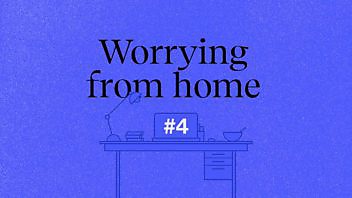





Comments
Antje ABeComm March 29th, 2020
A fantastic summary of my feelings when reading the PayPal email that I could not write better.
Doug Kessler April 7th, 2020
Thanks, Antje!
Ron Craig B2B stuff April 3rd, 2020
Thanks for the post Doug. I hope that once we get through this we as marketers will have learned a few lessons.
Doug Kessler April 7th, 2020
Thanks, Ron. Me, too.
I’m already learning a lot but I’m not sure how much is transferable to a business-as-usual world (a lot I hope).
Thanks again.
Arlene O’Reilly April 8th, 2020
Context. Context. Context.
Another way of saying it’s about them…not you.
Thanks for your reminder!!
Doug Kessler April 20th, 2020
Thanks, Arlene.
I agree it is all about context. And it gets trickier when the context seems to change daily!